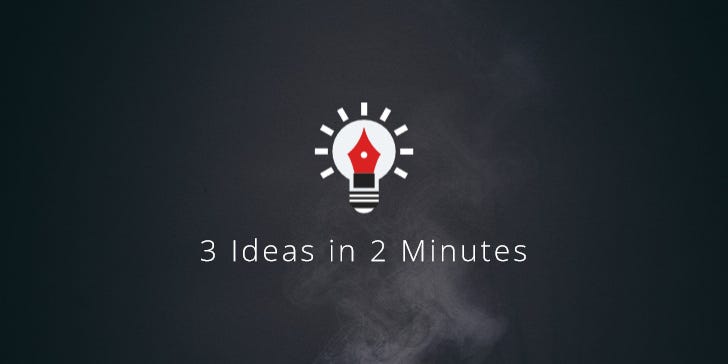#138: Captain Kirk Principle, Rational Choice Theory & Intuitive Traps
3 Ideas in 2 Minutes on Intellect and Intuition
I. Captain Kirk Principle
The Captain Kirk Principle is a metaphor for the conflicted relationship between the instinctive and the logical parts of our brains. It was coined by sceptic-in-chief Michael Shermer:
This psychological battle between intellect and intuition was played out in almost every episode of Star Trek in the characters of the ultrarational Mr. Spock and the hyperemotional Dr. McCoy, with Captain Kirk as the near perfect synthesis of both. Thus, I call this balance the Captain Kirk Principle: intellect is driven by intuition, intuition is directed by intellect.
—Michael Shermer, The Captain Kirk Principle
The principle is reminiscent of Daniel Kahneman’s distinction between System 1 and 2 thinking, which I wrote about in Mental Shortcuts: 5 Ways Heuristics Can Lead to Poor Decisions.
II. Rational Choice Theory
In criminology, Rational Choice Theory suggests that people engage in criminal activity as a result of a rational decision-making process. They consciously weigh the benefits and costs of a crime. If the former outweighs the latter, they’re more likely to offend.
However, Rational Choice Theory doesn’t assume offenders plan their crimes well. Nor does it assume they’re successful. It suggests people are not solely driven by external factors such as poverty. They go through a logical thought process, making a decision based on the information they have.
As an example, you’d expect a cluster of car break-ins in areas where there are plenty of cars parked, there’s a lack of security and lots of convenient escape routes. That would also mean by lowering the benefits (not leaving valuables in cars) and ramping up the potential costs (increased security) criminals will change their minds…and go steal somewhere else.
Source: Become a Problem-Solving Crime Analyst
III. Intuitive Traps
Intuitive Trap is a concept suggested by former intel analysts Cathy and Randy Pherson. Here’s how Randy explains these “manifestations of cognitive biases”:
We define intuitive traps as shortcuts or mental mistakes that practitioners make when conducting their business. A classic example is when police detectives assume that the next case they are working will be like the previous case or when a general prepares to fight the last war instead of anticipating how the next war will have to be fought.
According to a 2017 paper, projecting past experiences is one of the most common ones analysts face. It’s the assumption that “the same dynamic is in play when something seems to accord with an analyst’s past experiences.” I wrote more about their ranking in my article on 5 Common But Hidden Barriers to Critical Thinking. 🐘
Have a great week,
Chris
themindcollection.com


